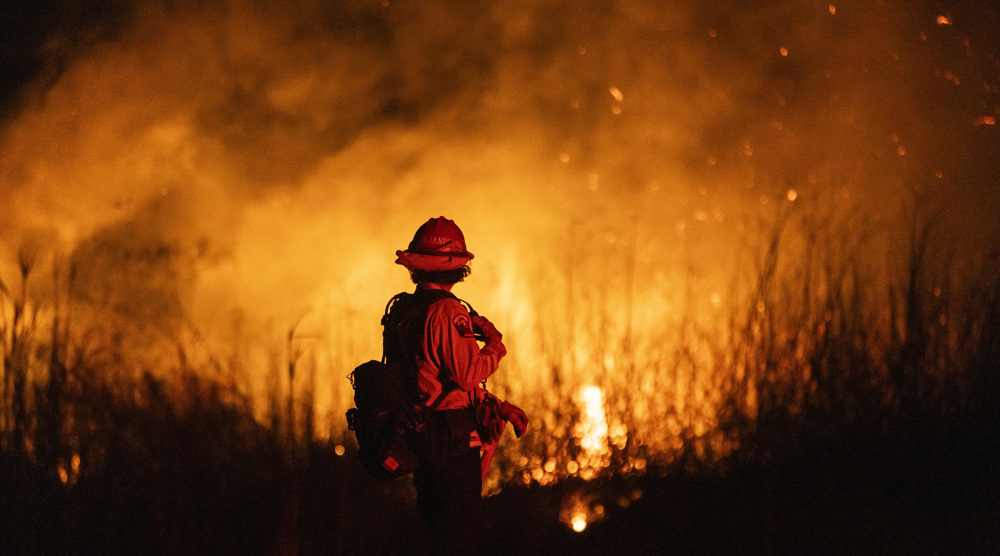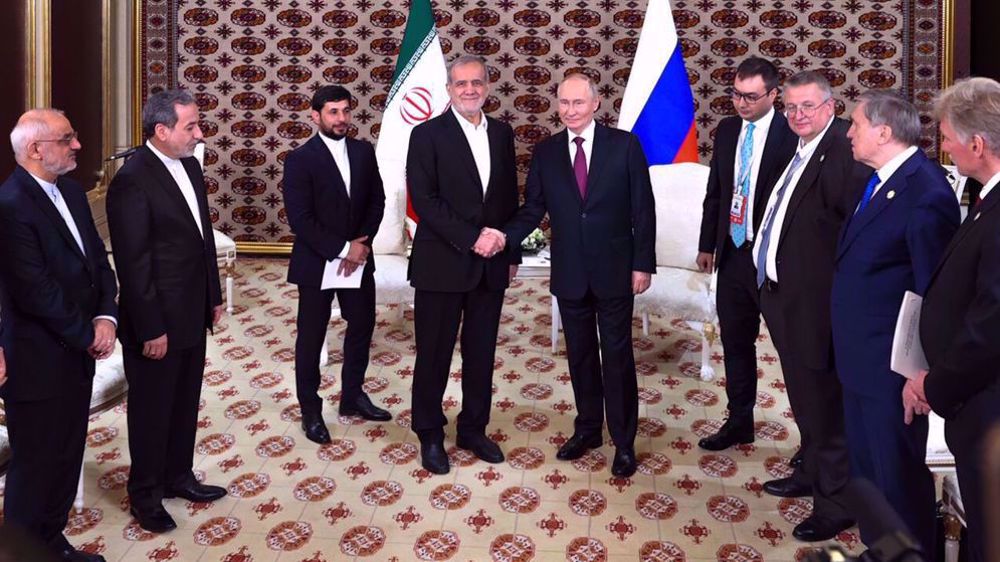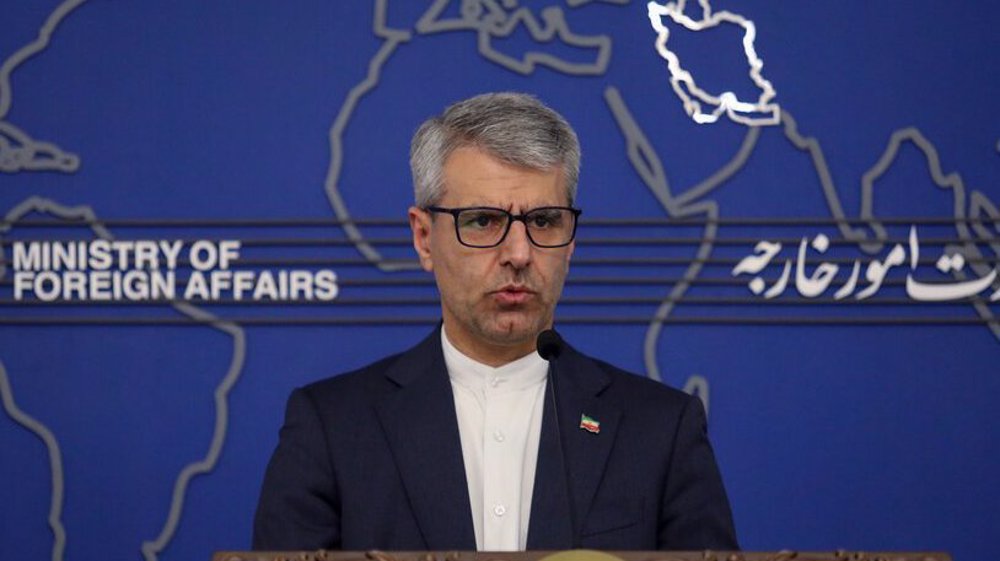Talks with French president on nuclear deal constructive: Iran FM
Iranian Foreign Minister Mohammad Javad Zarif says he held "constructive" negotiations with French President Emmanuel Macron on ways to salvage an international nuclear deal, over a year after the United States unilaterally withdrew from it.
"France has offered proposals to Iran about ways to implement the JCPOA (the nuclear accord, officially known as the Joint Comprehensive Plan of Action) and steps that the sides are required to take (to save the deal)," Zarif said after his talks with the French president in Paris on Friday.
He added that Iran has also presented proposals so that the JCPOA would be implemented completely.
He noted that Iranian President Hassan Rouhani and his French counterpart have held telephone conversations over recent weeks and said his meeting with Macron was also held in continuation of talks between the two presidents.
Iran and the five permanent members of the United Nations Security Council – the United States, France, Britain, Russia and China – plus Germany signed the nuclear agreement on July 14, 2015 and started implementing it on January 16, 2016.
Under the JCPOA, Iran undertook to put limits on its nuclear program in exchange for the removal of nuclear-related sanctions.
However, US President Donald Trump pulled his country out from the international nuclear deal in May last year and stepped up sanctions on the Islamic Republic.
Macron has recently stepped up diplomatic contacts with Tehran in a bid to allegedly cease the US economic war against Iran and deescalate tensions in the region.
The French president's top diplomatic advisor traveled to Iran to hold talks with the country's officials with the aim of contributing to easing tensions in the Persian Gulf region.
Read more:
- Collapse of nuclear deal will not benefit Iran, France, world: Rouhani
- Iran says ready to support nuclear deal 'just as France did'
- France: Iran nuclear deal can still be saved
The Iranian foreign minister further said the outcome of his meeting with the French president depends on the European Union's efforts to fulfill its obligations under the JCPOA after the US withdrawal.
"We will continue talks. Contacts between Macron and Rouhani will be continued," Zarif added.
Speaking in a telephone conversation with his French counterpart late on July 30, Rouhani criticized the failure of European signatories to the JCPOA to fulfill their commitments under the deal.
He said Europe has already lost a great deal of opportunities to honor its commitments and cooperate with Iran, stressing that normalization of oil trade and banking transactions are the primary expectations that the Islamic Republic would like Europe to satisfy.
Read more:
- Iran determined to keep all paths to saving JCPOA open, Rouhani tells Macron
- Rouhani calls US sanctions on Iran economic terrorism, an all-out war
Zarif also pointed to Tehran's crystal-clear stance on the nuclear issue. The top Iranian diplomat emphasized that the JCPOA is not open to re-negotiations.
However, Tehran is always ready to hold talks about the multilateral accord's implementation, he said.
In a joint press conference with Finland's Foreign Affairs Minister Pekka Haavisto in Helsinki on Monday, Zarif said the Islamic Republic has no interest in engaging in a fresh round of nuclear talks with the United States.
“Iran is not interested in negotiations with the United States to clinch a new nuclear accord,” Iran's top diplomat said, adding, “We had detailed negotiations with the United States and it was not us who left the negotiating table.”
Elsewhere in his Friday talks, Zarif added that since Iran started to scale back its commitments to the nuclear deal, it has repeatedly announced that such measures will be reversible, if the other side fulfills its obligations.
"We still have the same position and will hold discussions about it," the Iranian foreign minister pointed out.
The spokesman for the Atomic Energy Organization of Iran (AEOI), Behrouz Kamalvandi, said earlier this month that the country would take the third step in scaling back its commitments under the JCPOA "in a matter of a month" if European signatories to the agreement continue to renege on their obligations.
"If the opposite side fails to live up to its commitments in the remaining one month [set as a deadline], the third phase of reducing JCPOA obligations will start as per what the president has previously declared in his capacity as head of Iran's Supreme National Security Council," Kamalvandi said.
Iran most secure country to ensure Persian Gulf security: Zarif
The top Iranian diplomat also pointed to the issue of shipping and said the Islamic Republic has clearly announced that all countries should enjoy free shipping.
As a country with an extensive coastline along the Persian Gulf and the Sea of Oman and controlling the northern part of the Strait of Hormuz, Iran is the most secure country to ensure security in these areas and has always been interested in providing freedom of shipping there, Zarif said.
He also stressed the importance of securing freedom for Iranian ships which carry goods and oil.
During his tour of Northern European countries, Zarif emphasized on Thursday that Iran invests all its efforts in ensuring security of the Persian Gulf, asserting that the United States cannot cause insecurity in this strategic region.
“They should know that they cannot create insecurity [here],” the top diplomat stated while making a speech at the Norwegian Institute of International Affairs (NUPI), reminding that Iran’s Persian Gulf coastline stretches as far as 1,500 miles (2,414 kilometers), making it the longest among the body of water’s littoral states.
Later in the day, Zarif also held a meeting with French foreign minister Jean-Yves Le Drian.
Despite US efforts to destroy diplomacy, met with French President @EmmanuelMacron and @JY_LeDriane in Paris today.
— Javad Zarif (@JZarif) August 23, 2019
Interviewed with Euronews, AFP, & France24.
Multilateralism must be preserved.
Next stops Beijing, Tokyo & KL after a day in Tehran. pic.twitter.com/xfBN66SBly
Hamas: Israel's massacre in West Bank’s Jenin camp won’t break resistance
60 bodies recovered from abandoned South African gold mine: Police
Biden administration ‘quietly’ circumnavigating own ban on TikTok: Report
Iran Navy takes delivery of first advanced ‘signals-intelligence’ destroyer
Italian TV exposes Israeli manipulation of EU institutions
UK anti-corruption minister Siddiq resigns over links to Bangladesh ‘embezzlement probe’
VIDEO | Indian-administered Kashmir honors Imam Ali’s legacy of justice, leadership
Israel kills female Palestinian journalist based in Gaza’s Indonesian Hospital
















 This makes it easy to access the Press TV website
This makes it easy to access the Press TV website